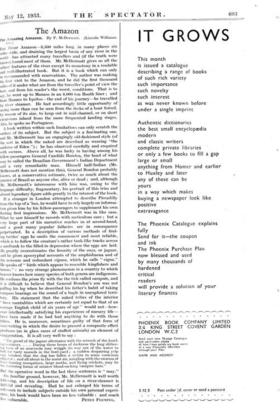The Amazon
The Amazing Amazon. By F. McDermott. (Lincoln Williams. 15s.)
rnE River Amazon-8,500 miles long, in many places six miles wide, and draining the largest basin of any river in the
workl—has attracted many travellers and (if the truth were known) bored most of them. Mr. McDermott gives us all the salient features of the river except its monotony in a readable and well-illustrated book. But it is a book which can only
be recommended with reservations. The author was making his first visit to the Amazon, and he did the first thousand
miles of it under what are from the traveller's point of view the
best, and from his reader's the worst, conditions. That is to sav, he went up to Manaos in an 8,000 ton Booth liner ; and from Manaos to Iquitos—the end of his journey—he travelled by river steamer. He had accordingly little opportunity of seeing more than can be seen from the decks of a boat forced, by reason of its size, to keep out in mid-channel, or on short excursions inland from the more frequented landing stages. Also, he spoke no Portuguese.
A book written within such limitations can only scratch the surface of its subject. But the subject is a fascinating one, and Mr. McDermott has an engagingly old-fashioned style (of the sort in which the naked are described as wearing "the uniform of Eden ") ; he has observed carefully and enquired with success. Above all, he was lucky in having among his fellow-passengers General Candido Rondon,. the head of what may be called the Brazilian Government's Indian Department and a very remarkable man. Himself half-Indian (Mr. McDermott does not mention this), General Rondon probably knows, at a conservative estimate, twice as much about the interior of Brazil as anyone else, alive or dead ; and, although Mr. McDermott's intercourse with him was, owing to the language difficulty, fragmentary, his portrait of this trim and almost legendary figure adds greatly to the interest of the book.
If a stranger in London attempted to describe Piccadilly from the top of a 'bus, he would have to rely largely on informa- tion given him by his fellow-passengers to supplement his own fleeting first impressions. Mr. McDermott was in like case. What he saw himself he records with meticulous care ; but a wry large part of his narrative reaches us at second-hand, and a good many popular fallacies are in consequence perpetuated. In a description of various methods of find- ing turtles' eggs he omits the commonest and most reliable, which is to follow the creature's rather tank-like tracks across a sandbank to the filled-in depression where the eggs are laid. He greatly overestimates the ferocity of the onca, or jaguar, and he gives apocryphal accounts of the amphisbaena and of the noisome and redundant cigana, which he calls " cigna." He speaks of" birds which appear to resemble kingfishers and herons " : no very strange phenomenon in a country to which heaven knows how many species of both genera are indigenous. lie confuses the ilium fly with the the tick called carapato, and it is difficult to believe that General Rondon's son was not [milling his leg when he described his father's habit of taking umpass bearings on the sound of a bugle in unexplored terri- ory. His statement that the naked tribes of the interior ' have mentalities which are certainly not equal to that of an iverage English child of six years of age" would not—how- wer intellectually satisfying his experiences of nursery life— lave been made if he had had anything to do with those iribes. He is, moreover, sometimes guilty of that form of wer-writing in which the desire to present a composite effect reduces (as in glass cases of stuffed animals) an element of 'xaggeration. It is all very well to say : " The growl of the jaguar alternates with the screech of the howl- ag monkeys. . . . During these hours of darkness the long slither. hg form of an anaconda may wriggle its way out of the water to sok for tasty morsels in the fowl-yard ; a sudden despairing yelp nay betoken that the dog has fallen a victim to some voracious illigator ; and all about in the moist air, mingling with the swarms of ever-bearing mosquitoes, large moths, and flying crickets, may be Ile fluttering forms of sinister blood-sucking vampire bats."
"lilt the operative word in the last three sentences is "may." On familiar ground, however, Mr. McDermott is Well worth '0110wing, and his description of life on a river-Steamer is 'aitliful and revealing. Had he not enlarged his terms of eference to include subjects outside his own personal experi- 'nee, his book -would have been no less valuable : and much
































 Previous page
Previous page